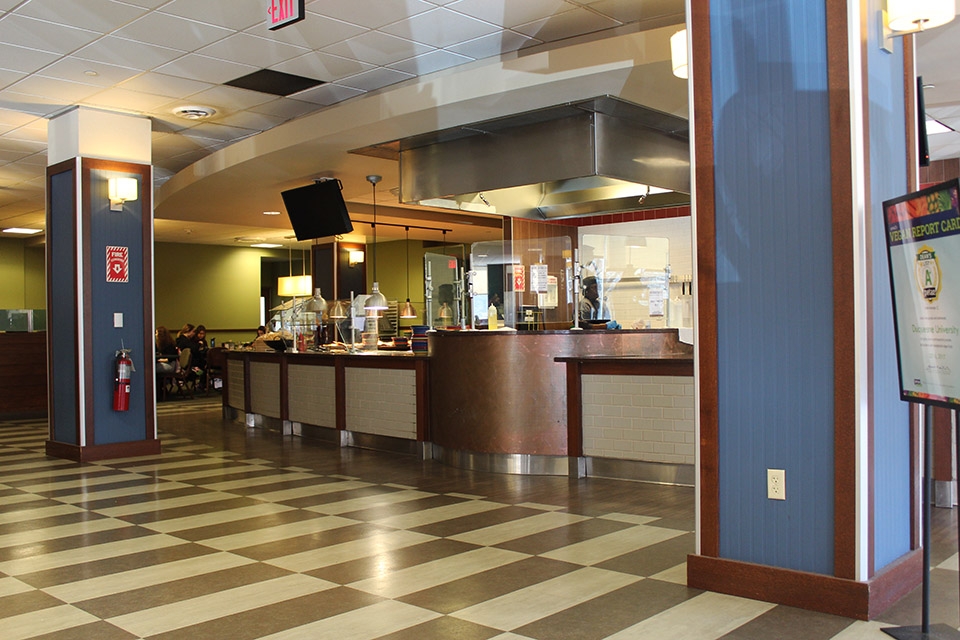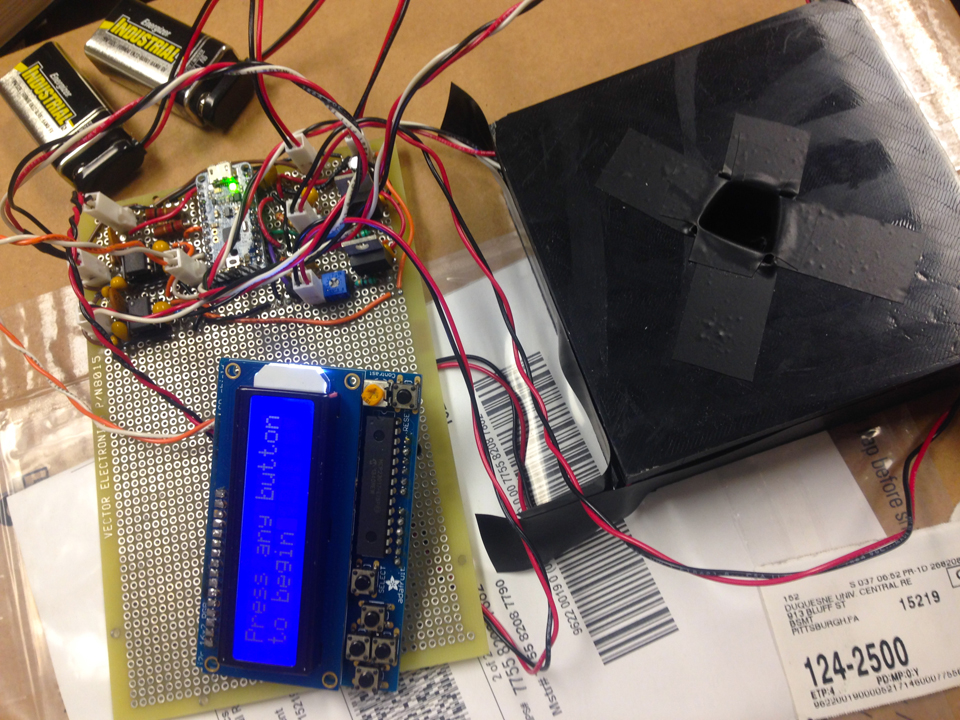

Hogan Dining Hall in Towers is where on-campus students eat. DU is creating a program to help students with food insecurities.
Raymond Arke and Kailey Love | The Duquesne Duke
04/19/2018
Often, college students juggle school, loan payments, jobs and other extracurriculars. Balancing all of these responsibilities can be stressful enough. For some, however, an even greater existential weight changes many students’ encounters with higher education.
A recently released study by Temple University and Wisconsin HOPE Lab researchers showed that 36 percent of students at the 66 colleges and universities surveyed do not get enough to eat. This statistic was discovered in the third part of a series of studies conducted by the Wisconsin HOPE Lab. The study was done on the issue of college student’s access to housing and security and is by far the largest yet. This is according to Anthony Hernandez, one of the report’s co-authors. It was also the first national study of its kind.
“We don’t think a lot of people know about [student housing], which is why we’ve been doing these studies,” Hernandez said. “One of the surprising findings here is that people just couldn’t believe that students who have financial aid, who are working part time jobs, were still grappling with housing and food insecurity. We’re not providing them with the resources they need to succeed.”
Of the 66 four year universities and two year community colleges part of the study, two are in Pennsylvania: Butler County Community College and Temple University.
Hernandez detailed interviews with students that participated in the survey who described being too hungry to pay attention in class, or having to leave lectures early to make it to a shelter on time in order to secure a place to sleep that night.
“Those two examples illustrate that when students’ basic needs are not met, they cannot be fully immersed in the learning process,” Hernandez said. “There are persistent, hurtful narratives about what it means to be a college student … People tend to think that being a college student is eating Ramen and sofa surfing on someone’s couch. Another one that is really hurtful is this idea that you can work during the summer and afford to pay for your college. Those things just don’t ring true.”
Hernandez explained that the idea of college completion was the underlying motive that drove the study. By using Maslow’s Hierarchy of Needs as a central theory in their research, the study found that if a student’s basic needs are not met, graduation becomes much more complicated. Compounding that problem is rising tuition prices.
Duquesne’s undergraduate tuition rates, for example, increased across each undergraduate program for the 2018-2019 school year. The Liberal Arts, Education, Business, Health Management Systems, Nursing, Natural & Environmental Sciences, Biomedical Engineering and Spiritan Division tuition sits at $38,178, a $1,784 increase, according to Duquesne’s website. Other programs also saw slight increases. Hernandez cites tuition increases as one of the leading factors preventing students from accessing basic needs.
“In the last 20 years, we’ve seen the price of college go up dramatically. We’ve also seen a large increase in the number of people who are trying to access college,” Hernandez said. “Now you have more lower-middle class, first generation going to school. Those folks tend not to arrive with a lot of resources. The other factor is that financial aid doesn’t go as far as it used to.”
Duquesne is not exempt from this nationwide problem and is taking steps to address food insecurity. Alia Pustorino-Clevenger, director for student life assessment and co-curricular engagement, is leading Duquesne’s efforts.
“This is a personal area of interest for me as I have been involved in efforts associated with addressing food and housing insecurity since I was an undergraduate myself in the 1990’s in Philadelphia,” Pustorino-Clevenger said.
Pustorino-Clevenger explained that this problem has been growing on campus for the past several years.
“Over the past few years, Campus Ministry, the Center for Student Involvement and several other departments noticed an increase in students who demonstrated food insecurity on campus and recognized that something needed to be done,” she said. “In these instances, our respective departments provided the individual student with resources to help them, even if that was only a stopgap measure to a larger issue.”
However, a more permanent solution was needed, which required a “formal assessment.”
“Our efforts began with participation in the Campus Cupboard Study — a needs assessment of collegiate food insecurity in Southwest Pennsylvania, which was initiated by the Greater Pittsburgh Community Food Bank and was authored by the Office of Child Development at the University of Pittsburgh,” Pustorino-Clevenger said. “Several colleagues and myself wrote Duquesne specific questions in summer 2017, and in mid-fall 2017 this survey was sent to all undergraduate and graduate students at Duquesne.”
Hernandez suggested that colleges could participate in another HOPE Lab survey in the upcoming fall, which would offer more detailed information.
“Each school receives an individual report. We released a national report, but we also send every school an individual breakdown of what is going on in their campus, and that data is actionable,” he said.
Duquesne’s online survey was successful, with more than 1,000 students participating, according to Pustorino-Clevenger.
“Reports from the survey revealed that students who participated in the studies reported varying levels of food insecurity on the campuses, but that there is a need whether that is a significant population or a smaller one,” she said.
Pustorino-Clevenger said she was still working on formalizing the Duquesne-specific data, but acknowledged there were student respondents who noted suffering from food insecurity. In response, she is teaming with Rev. Dan Walsh, from Campus Ministry, to form a pantry.
“Father Dan and myself have proposed the development of the Brother Gerald Keating Initiative to the administration,” she said. “The Keating Initiative is named in honor of Brother Gerald, who served our campus community for nearly 60 years in the 20th century — with specific emphasis upon feeding impoverished and underserved students during the period of the Great Depression.”
This program would consist of a food pantry, along with other services, such as a nutritionist, health services and access to the Counseling and Wellbeing Center, according to Pustrino-Clevenger.
“The program will begin in much the same way that the Career Closet began — as a grass roots effort on campus meant to serve our students who have need receiving both substantive and also supportive services to help them be successful in their academic and personal pursuits,” she said.
Pustorino-Clevenger noted The Keating Initiative has already garnered student support from the Student Government Association (SGA), the Student Health Advisory Council and the Graduate and Professional Student Council.
SGA President Eric Chatterjee expressed his “gratitude” to Campus Ministry and the Center for Student Involvement for their work, citing their “tireless work on behalf of students.”
“I will support Spiritan Campus Ministry and the Center for Student Involvement in any way I can to advance the effort to address student hunger,” he said.
Chatterjee also addressed students who may be suffering from food insecurity right now.
“If you are a student who struggles with food insecurity, please reach out to me, provided you feel comfortable doing so,” he said. “I would love the opportunity to hear from you. Please know that people do care, you are not alone, and that I am here to represent you.”
Hernandez said that food pantries at colleges are becoming more common, mentioning the national College and University and Food Bank Alliance (CUFBA). Pustorino-Clevenger said Duquesne has been a part of CUFBA since 2017.
“We are currently utilizing this resource for best practices on how to implement and run a pantry,” she said. “Joining CUFBA gave us the contacts and resources available at peer institutions to help determine how a program of this nature could function on our campus.”
The University of Pittsburgh is also a participant in CUFBA since the spring of 2015 with the opening of Pitt Pantry, according to Deborah Todd, communications manager at Pitt. Todd said the pantry served 217 students in 2017.
However, Hernandez said that more needs to be done by colleges and universities at a more administrative level in order to remedy this issue.
“We do see that a lot of universities are now starting the ‘pantry’ initiative on campus working with food banks. Those are slightly helpful, but we tend to see students doing the labor initiatives,” Hernandez said. “Students are running them, managing them, stocking them — students are doing the footwork. What we’d like to see is more system level action — that means the administrators, chancellors and presidents thinking about drafting real, impactful solutions like making college more affordable, providing more financial aid.”



